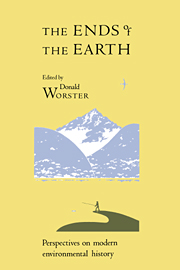Book contents
- Frontmatter
- Contents
- Preface
- INTRODUCTION
- DYNAMICS OF CHANGE
- THE EUROPEAN INVASION
- CONSERVING NATURE – PAST AND PRESENT
- 8 The Myth of the Southern Soil Miner: Macrohistory, Agricultural Innovation, and Environmental Change
- 9 Toward an Interactive Theory of Nature and Culture: Ecology, Production, and Cognition in the California Fishing Industry
- 10 Efficiency, Equity, Esthetics: Shifting Themes in American Conservation
- 11 The Changing Face of Soviet Conservation
- CONCLUSION
- Appendix: Doing Environmental History
- Bibliography
- Contributors
- Index
10 - Efficiency, Equity, Esthetics: Shifting Themes in American Conservation
Published online by Cambridge University Press: 05 June 2012
- Frontmatter
- Contents
- Preface
- INTRODUCTION
- DYNAMICS OF CHANGE
- THE EUROPEAN INVASION
- CONSERVING NATURE – PAST AND PRESENT
- 8 The Myth of the Southern Soil Miner: Macrohistory, Agricultural Innovation, and Environmental Change
- 9 Toward an Interactive Theory of Nature and Culture: Ecology, Production, and Cognition in the California Fishing Industry
- 10 Efficiency, Equity, Esthetics: Shifting Themes in American Conservation
- 11 The Changing Face of Soviet Conservation
- CONCLUSION
- Appendix: Doing Environmental History
- Bibliography
- Contributors
- Index
Summary
A new chapter in the history of the American environment opened about 1900. For several decades discontent with the way Americans dealt with the natural world had been mounting. Three centuries of unbridled capitalism had produced a monumental transformation in the American environment. The relatively pristine environment encountered by the European settlers in the 1600s had been turned into a world of agriculture, industry, and urbanism. These developments enjoyed almost universal acclaim among Americans. Precisely planted rows of corn and wheat, neat white farm houses, and a one-room country school represented civilization, democracy, and progress. On the seal of the Northwest Territory a fruitbearing tree towers over an ax-felled tree, while in the background the rising sun and commercial boats plying the Ohio River represent the dawn of a new era. The seal bears the motto Meliorem lapsa locavit – “From the fallen tree a better one has grown.” Belching smokestacks, noisy locomotives, and smelly oil wells conveyed prosperity and national greatness.
But by the late 1800s growing numbers of Americans grew increasingly worried about the costs of this edition of progress. They began to fear that something valuable and irreplaceable was being lost in the headlong rush to expand and grow richer. They feared, too, that unrestrained capitalist expansion was undermining the very resource base of national prosperity. Hence by the 1890s there was widespread recognition that old patterns of economic development needed drastic change. From a mixture of concern about irreversible changes in the natural world and anxiety about the future course of American capitalism, Americans began to redefine their relationship to their environment.
- Type
- Chapter
- Information
- The Ends of the EarthPerspectives on Modern Environmental History, pp. 230 - 251Publisher: Cambridge University PressPrint publication year: 1989
- 2
- Cited by



